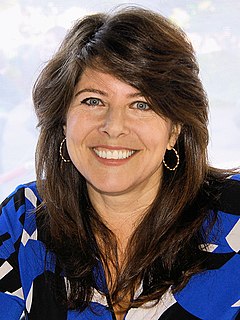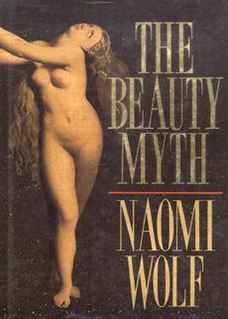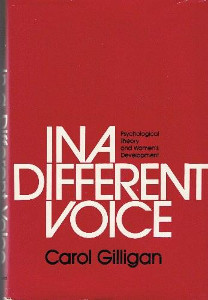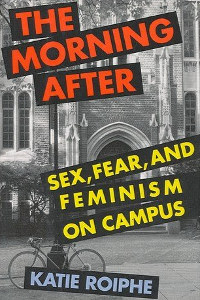Herstory is a term for history written from a feminist perspective and emphasizing the role of women, or told from a woman's point of view. It originated as an alteration of the word "history", as part of a feminist critique of conventional historiography, which in their opinion is traditionally written as "his story", i.e., from the male point of view. The etymology of history is unrelated to gender and derived from the Ancient Greek ἱστορία (historía), meaning "inquiry", "knowledge from inquiry", or "judge".
Misandry is the hatred of, contempt for, or prejudice against men or boys in general; it is the counterpart of misogyny, prejudice against women.

Naomi Rebekah Wolf is an American feminist author and journalist.

Sexual objectification is the act of treating a person solely as an object of sexual desire. Objectification more broadly means treating a person as a commodity or an object without regard to their personality or dignity. Objectification is most commonly examined at the level of a society, but can also refer to the behavior of individuals and is a type of dehumanization.

Sexual Personae: Art and Decadence from Nefertiti to Emily Dickinson is a 1990 work about sexual decadence in Western literature and the visual arts by scholar Camille Paglia, in which she addresses major artists and writers such as Donatello, Sandro Botticelli, Leonardo da Vinci, Edmund Spenser, William Shakespeare, Johann Wolfgang von Goethe, Samuel Taylor Coleridge, Lord Byron, Emily Brontë, and Oscar Wilde. Following Friedrich Nietzsche, Paglia argues that the primary conflict in Western culture is between the binary forces of the Apollonian and Dionysian, Apollo being associated with order and symmetry, and Dionysus with chaos, disorder, and nature. The book received critical reviews from numerous feminist scholars, but was praised by numerous literary critics.

Christina Marie Hoff Sommers is an American author and philosopher. Specializing in ethics, she is a resident scholar at the American Enterprise Institute. Sommers is known for her critique of contemporary feminism. Her work includes the books Who Stole Feminism? (1994) and The War Against Boys (2000). She also hosts a video blog called The Factual Feminist.
Sex-positive feminism, also known as pro-sex feminism, sex-radical feminism, or sexually liberal feminism, is a feminist movement centering on the idea that sexual freedom is an essential component of women's freedom.
The term postfeminism is used to describe reactions against contradictions and absences in feminism, especially second-wave feminism and third-wave feminism. The term postfeminism is sometimes confused with subsequent feminisms such as fourth-wave feminism and xenofeminism.
Victim feminism is a term used by some liberal and libertarian feminists in the 1990s to contrast their conceptions of feminism with other feminists who they view as reinforcing the idea that women are weak or lacking in agency, and therefore need to be protected.

The Beauty Myth: How Images of Beauty Are Used Against Women is a nonfiction book by Naomi Wolf, originally published in 1990 by Chatto & Windus in the UK and William Morrow & Co (1991) in the United States. It was republished in 2002 by HarperPerennial with a new introduction.

Clothed male, naked female (CMNF), or clothed male, nude female, is a genre of nudity in which one or more women are nude while one or more men are clothed.
Antifeminism, also spelled anti-feminism, is opposition to some or all forms of feminism. In the late 19th century and early 20th century antifeminists opposed particular policy proposals for women's rights, such as the right to vote, educational opportunities, property rights, and access to birth control. In the mid and late 20th century antifeminists often opposed the right to abortion and, in the United States, the Equal Rights Amendment. In the early 21st century antifeminism has sometimes been an element of violent, far-right extremist acts.

In a Different Voice: Psychological Theory and Women's Development is a book on gender studies by American professor Carol Gilligan, published in 1982, which Harvard University Press calls "the little book that started a revolution".

Sexual Politics is a 1970 book by Kate Millett, based on her PhD dissertation. It is regarded as a classic of feminism and one of radical feminism's key texts. Sexual Politics analyses the subjugation of women in prominent art and literature in the 20th century, specifically looking at the ubiquity of male domination in culture.

The Morning After: Sex, Fear and Feminism on Campus is a 1993 book about date rape by author and journalist Katie Roiphe. Her first book, it was reprinted with a new introduction in 1994. Part of the book had previously been published as an essay, "The Rape Crisis, or 'Is Dating Dangerous?'" in the New York Times Magazine.

The nude, as a form of visual art that focuses on the unclothed human figure, is an enduring tradition in Western art. It was a preoccupation of Ancient Greek art, and after a semi-dormant period in the Middle Ages returned to a central position with the Renaissance. Unclothed figures often also play a part in other types of art, such as history painting, including allegorical and religious art, portraiture, or the decorative arts. From prehistory to the earliest civilizations, nude female figures are generally understood to be symbols of fertility or well-being.
Equity feminism is a form of liberal feminism that advocates the state's equal treatment of women and men without challenging inequalities perpetuated by employers, educational and religious institutions, and other elements of society. The concept has been discussed since the 1980s. Equity feminism has been defined and classified as a kind of classically liberal or libertarian feminism, in contrast with social feminism, difference feminism, gender feminism, and equality feminism.
Gynocentrism is a dominant or exclusive focus on women in theory or practice; or to the advocacy of this. Anything can be considered gynocentric when it is concerned exclusively with a female point of view.

Camille Anna Paglia is an American feminist academic and social critic. Paglia has been a professor at the University of the Arts in Philadelphia, Pennsylvania, since 1984. She is critical of many aspects of modern culture and is the author of Sexual Personae: Art and Decadence from Nefertiti to Emily Dickinson (1990) and other books. She is also a critic of contemporary American feminism and of post-structuralism, as well as a commentator on multiple aspects of American culture such as its visual art, music, and film history.

Who Stole Feminism? How Women Have Betrayed Women is a 1994 book about American feminism by Christina Hoff Sommers, a writer who was at that time a philosophy professor at Clark University. Sommers argues that there is a split between equity feminism and what she terms "gender feminism". Sommers contends that equity feminists seek equal legal rights for women and men, while gender feminists seek to counteract historical inequalities based on gender. Sommers argues that gender feminists have made false claims about issues such as anorexia and domestic battery and exerted a harmful influence on American college campuses. Who Stole Feminism? received wide attention for its attack on American feminism, and it was given highly polarized reviews divided between conservative and liberal commentators. Some reviewers praised the book, while others found it flawed.













